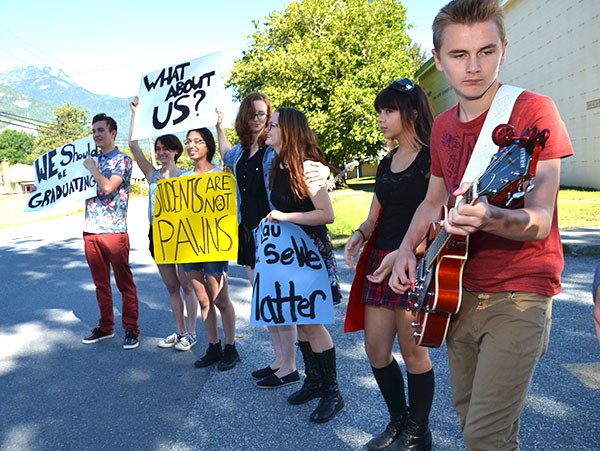While the provincial government said “no” to handing over the teachers’ dispute to a third party on Saturday, Sept. 6, it’s the solution the British Columbia Teachers’ Federation (BCTF) came up with two days later.
Binding arbitration offers a “reasonable” and “fair” solution to put an end to the teachers’ strike, BCTF president Jim Iker told a press conference on Monday, Sept. 8. On Wednesday, Sept. 10, the federation hosted a vote for teachers asking them if they would leave the picket lines if the provincial government agrees to binding arbitration. Iker said he was confident that the outcome would be a “yes.”
“I am hoping the government will do the right thing now,” Iker said. “Let’s put it to binding arbitration.”
On Friday, Sept. 5, B.C.’s education minister, Peter Fassbender, let it be known he is not a “fan” of binding arbitration. Fassbender stressed the drawbacks of handing the teachers’ dispute to a third party.
However the settlement is reached, it needs to be in a manner that is responsible to all sectors of the community, including taxpayers, Fassbender said. The BCTF’s demands need to be “realistic” and “affordable,” he noted. The provincial government has stated from the beginning that officials won’t raise taxes to serve one union’s demands, he noted.
The BCTF is proposing binding arbitration to settle compensation, benefits and preparation issues. The federation is asking that the government leave matters currently before the court, and related to the court ruling, to the courts.
“We don’t think arbitration is an appropriate avenue for matters before the courts,” Iker said.
While Fassbender was delivering the update on the strike last week, 16-year-old Callista Ryan was outside Howe Sound Secondary School speaking out for youth rights.
Last month, Ryan wrote a letter to The Squamish Chief outlining the United Nations treaty the Conventions on Rights of the Child. She explored how she believes the strike goes against children’s rights to an education. Ryan’s letter was picked up by the Huffington Post and before long, radio and television crews were calling her up.
“There is so much stress and anxiety at the moment,” Ryan said in regards to the dispute.
Ryan should be attending Grade 11 classes. Some of the members of the youth rally are heading into Grade 12.
“It’s difficult for them,” Ryan said. “They should be applying for scholarships.”
Asia Mader organized the student protest. The 15-year-old said she’s looked into the dispute and can’t support either side.
Students’ concerns need to be heard, Mader reiterated. When strikes hit services such as the health profession, staff limit their work to vital services, she noted. Education should be considered along the same vein, Mader said.
“The students have a voice. People should know how much it is affecting us.”
The dispute between the teachers’ union and the province has dragged on since June of 2013 when the teachers’ contract expired. The two sides have disagreed over wages, benefits and working conditions. The major sticking point now is reportedly class size and composition.



